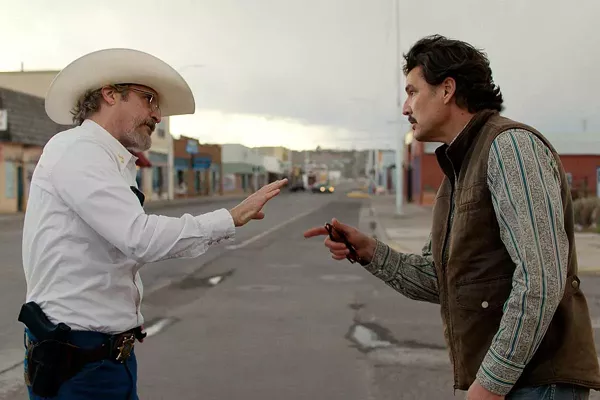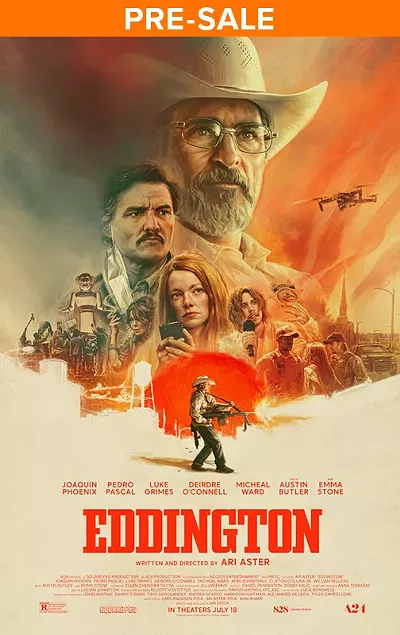Ari Aster’s new film Eddington is a lot of things. It’s a period piece set in May 2020, right as the COVID lockdown and mask mandates were being implemented. It’s a neo-noir revisionist western hung across the backdrop of a dying town in New Mexico. (Noir Mexico?) It’s a doomscroll into the heart of America. It’s an unflinching look at the relentless culture war that kicked into a new gear during COVID and turned the U.S. into a country-sized Tower of Babel we’re all precariously teetering on the edge of, before eventually surrendering to the inevitable fall. It’s a gut-busting comedy and a cynical, cacophonous howl at the absurdity of all of us amplifying our voices louder than they have ever been in history, while still not understanding the words coming out of each other’s mouths.
More than anything, Eddington is a satire that is so fearlessly constructed that most people eager to be outraged won’t even realize where to place their anger until the film is almost over. Aster knew that if he stated his politics too plainly he would only be preaching to the choir. So instead he built a 155-minute masterpiece that not only captures the solitude of living online, which was initially promised as a thing that would foster connection more than foment hatred, but also manages to capture a snapshot of America that feels immediate and momentous.
Eddington won’t make much money and most audiences and some critics will think it’s a tonally inconsistent mess that fails to state any of its ideas with subtlety. I can’t disagree with that statement, other than to say I’m not sure we live in a time where subtlety is warranted or appreciated. Satire shouldn’t be subtle anymore. It needs to be brutal. A timeless satire needs to hit people in the face so hard that when they open their front doors, the sky doesn’t look the same anymore. Stanley Kubrick wasn’t after subtlety with Dr. Strangelove and Paddy Chayefsky certainly wasn’t trying to gently communicate ideas with Network. I hold Aster to those same standards.
Joaquin Phoenix gives another densely nuanced performance here, this time playing Joe Cross, the sheriff of Eddington, New Mexico, a dilapidated small town in desperate need of some financial blood to revive its dying infrastructure. This blood is coming by way of a new massive data center, which is being spearheaded by Mayor Ted Garcia (an always welcome Pedro Pascal).
The mayor and the sheriff don’t like each other much. Cross doesn’t like wearing a mask because he has asthma and despises Garcia for his easy-going popularity, charisma, and mask mandate. Garcia thinks Cross is a fool and doesn’t understand why he wouldn’t want a massive data center to come to town. These men speak to each other constantly throughout the film and I’m not sure they hear each other once.
I don’t want to give any more of the story away other than to say it’s a compelling and unpredictable one that takes the blackly funny violence of early Coen Bros, the western deconstructionism of Unforgiven, and the anxiety-riddled existentialism of Aster’s earlier work and congeals into something that feels like an historical record of a time most of us would rather forget.
One of the first days of lockdown, I was lying in bed in the middle of the night, scrolling through Instagram and watching in real time what felt like the world ending. My area was surrounded by wildfires, so even the air outside was unsafe to breathe and all I could do was look at all these other people across the world going through similar things (most people in much worse situations than myself). Instead of finding solidarity, I watched COVID politicize and divide my country in a way that felt, well, straight out of a bleakly cynical satire. Instead of a pandemic reminding us that we were all humans, struggling together on a rock floating in space, we chose to hoard toilet paper and act like mid-tantrum children. Somehow, Aster captures that feeling of society in decline in a single two-and-a-half-hour film.
Eddington is hard to watch because there was nothing remotely pleasurable about being alive in 2020. Somehow still, the film manages to be hilarious, heart-wrenching, shocking, infuriating, and genuinely exciting, while still feeling like an honest, microcosmic appraisal of America. But Aster forgoes the miserabilist themes of Beau is Afraid and Hereditary for something that, while not necessarily hopeful, feels like it sees something positive that could be on the horizon.
The irony of so much of Eddington being built around the construction of a data center in a town where the communication breakdown is total and irreversible is delicious. Aster knows exactly how to poke fun at our hypocrisies, insecurities, and obsessions, while still being playful enough not to feel like a scold. Are we still too close to 2020 for us to be comfortable looking into a funhouse mirror of those days? Probably. But I still found great catharsis in watching Eddington. The film is essential. Maybe not right now, but it will be.
-
Eddington
149 minutes
(Except for the headline, this story has not been edited by PostX News and is published from a syndicated feed.)


